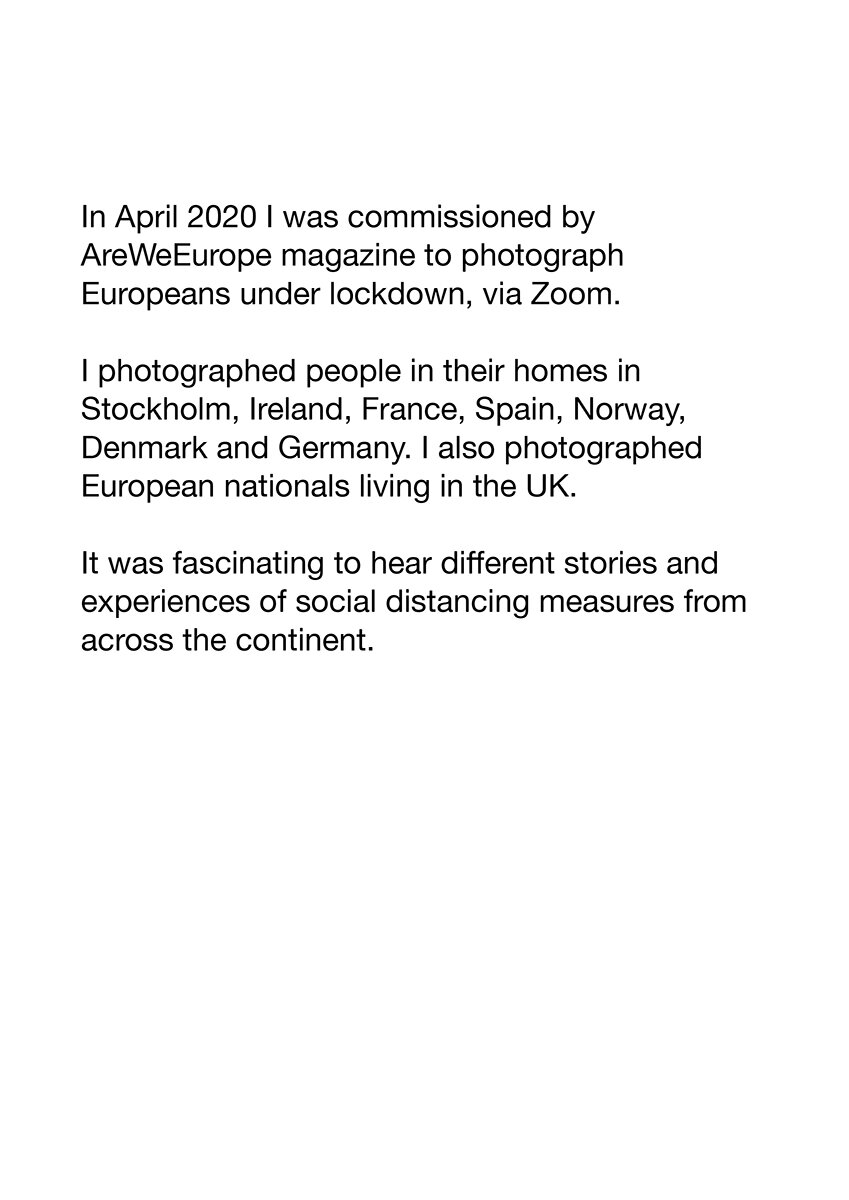
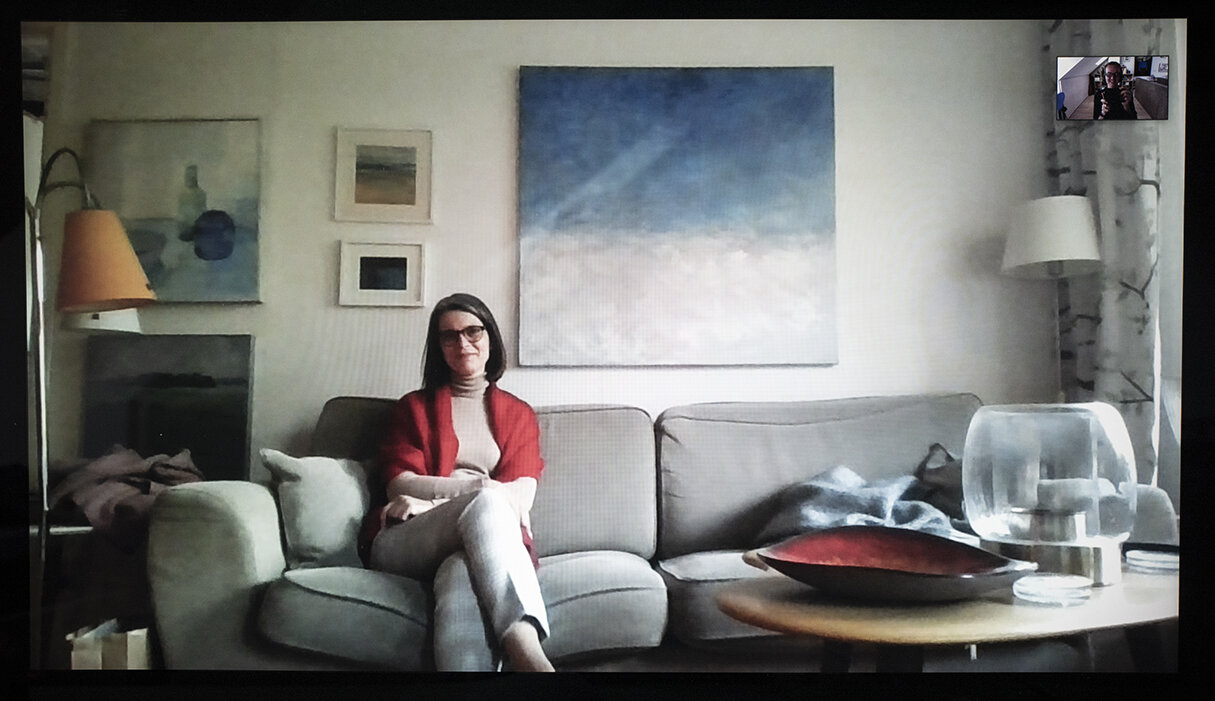
Although Sweden has taken a less heavy handed approach to lockdown than most countries in Europe, life has certainly changed dramatically in Stockholm, where Annika lives. The city is very quiet, but it is not completely deserted. Many shops, cafes and restaurants remain open. You must keep your distance from other people and order from your seat, rather than at the bar. If restaurants and cafes do not comply with the social distance rules, they are closed down. All the museums are closed. You are discouraged from inviting people into your house and many people are now working from home.
Many schools for younger children have been kept open when staffing allows. Virtual schooling is the norm for older children or when too many teachers become sick.
Annika is a communications manager for a church and she now works from home a lot of the time. At her church, there are no ceremonies other than funerals and there are many more of those than normal. Mostly only 10 to 15 people will attend, although 50 are allowed. There are no gatherings or refreshments afterwards.
Annika’s father died in early March, just before many restrictions came into force. She says she would have hated not to be able to sit by his bedside. They were able to hold the funeral in Southern Sweden where things are still more relaxed than in Stockholm. They have had fewer COVID19 cases there. Sweden as a whole only has a population of 10 million, so it is far less densely inhabited than the UK.
The Swedish government took the approach that they wanted to ensure that everyone would be able to receive the care they needed, without shutting things down completely. Annika says she was sceptical at first about this response but now wonders if it isn’t going to make opening up society again much easier than for countries like their neighbour Norway. Surely, she ponders, society cannot be kept closed for two years.
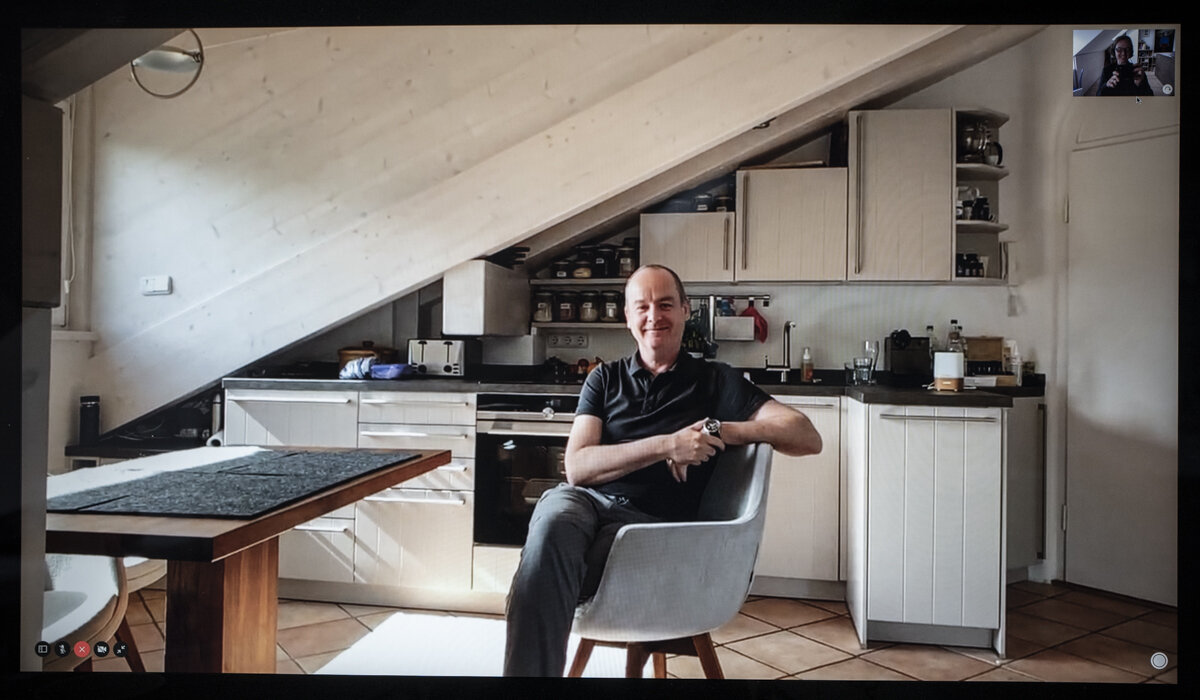
Dirk lives in the Bavarian Alps in a ski resort called Garmish-Partenkirchen. He works as a leadership consultant and a health practitioner. Much of his work can continue via Zoom calls and Skype. In normal times, Dirk also rents out a couple of holiday apartments. The government no longer allows this and if he were to do so, there would be a large fine.
Dirk feels very blessed to live in such a beautiful part of the world and for the first time to be able to enjoy it without any tourists. His partner is Romanian, and she is also content to be so close to nature during this time, rather than in her apartment in Bucharest.
Bavaria was one of the Corona Virus hotspots as the pandemic hit Europe. It still has quite a high number of cases. However, Germany appears to have had an effective response, which is supported by the vast majority of the population. Consequently, their society is slowly opening up and things are gradually being relaxed. Many shops are now open to mask wearing customers, but there is still a lot of fear.
In the beginning of March in Germany, all the hospitals were emptied of people suffering from ailments other than COVID19, so that they wouldn’t be overwhelmed. Dirk wonders about the cost to those sick people without the virus. He also wonders about all the elderly who have been forcibly isolated. “If I was 85 and told that I couldn’t see my family, I would wonder what it’s all about,” he says.
Dirk thinks that, perhaps this lockdown will lead to a reset of society but believes there are many ethical questions to be asked about our response so far.
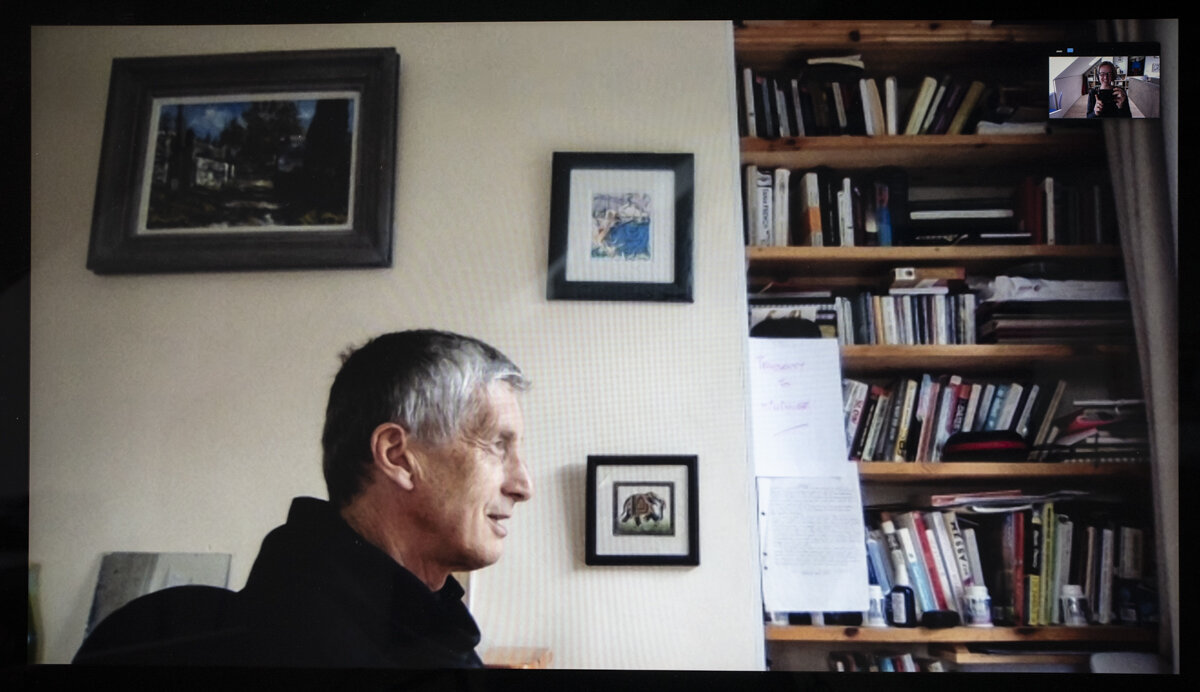
Father Simon is a monk at Glenstal Abbey, near Limerick in the West of Ireland. He became a monk when he was 19 years old and this year will be his 50th Jubilee.
The COVID19 lockdown has been the first time in those 50 years that he’s know the Abbey to be so tranquil. Simon told me “There’s harmony and peace. It’s the Abbot’s dream! All the monks are here, they can’t go anywhere and it’s quiet.”
In the Abbey grounds there is a boarding school and a guest house. Usually, there are lots of visitors, cars and of course, school children. Currently, there are none and Simon worries about how things will ever get back to normal, in particular the school.
One of Father Simon’s roles prior to the lock down was to run retreats. These have all been cancelled for the time being, but he’s started to make recordings for broadcast on You Tube. The films have been well received but Simon says, he needs to be careful that he doesn’t put too much pressure on himself, to broadcast too often. Last year he suffered from burn out after a period of working too hard, he doesn’t want that to happen again. He told me he’s taking a little holiday away from his monastic cell, in the under utilised Abbey Guest house, at the moment. Hopefully that will help!
Ireland has kept its COVID infections relatively low and things are going to start opening up again soon. I’m sure the future of Glenstall Abbey will not be so quiet.
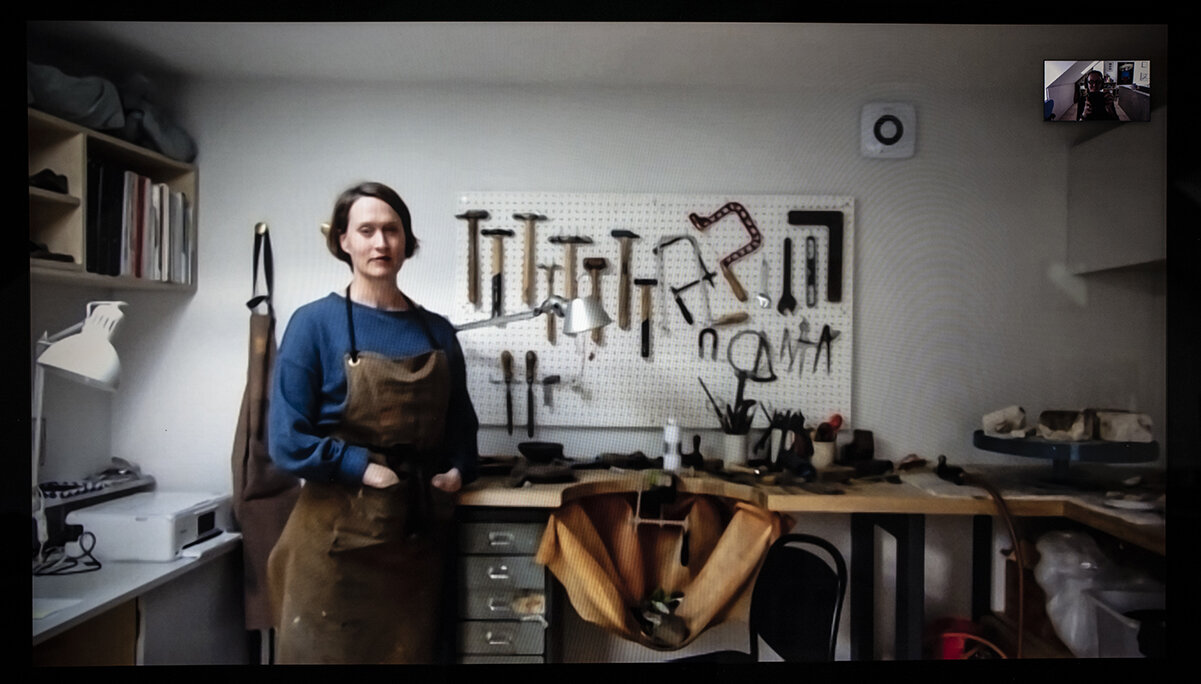
Ane is from Denmark but has lived in the UK for 25 years. She has been a silversmith for 20 years. I photographed her via Zoom in her garden studio.
Ane lives in Hackney, East London, where she loves her community and feels a great solidarity with her neighbours. Even though there have been quite a lot of cases of COVID19 in her area, Ane feels very happy to be there. However, she is relieved that her 81 year old mother is in Denmark, where the situation appears to be much safer. If her mother was in the UK while she was in Denmark, Ane says she would be much more concerned.
As a maker, who works from her recently completed garden studio, Ane says that isolation and repetition are familiar to her. However, with three children at home since lockdown, she is busier than ever and can only carve out about 15 hours per week to work.
Ane says that she loves an artistic brief, a restriction, to aid her creativity. For 8 years she had a self-imposed a rule of only making work from one sheet of metal. Lockdown has created a new kind of restriction on her work. So, she has decided for the time-being that she will only make what she already knows.
This year Ane was hoping to have a solo exhibition to celebrate her 21st birthday of being a silversmith at a gallery which is also 21 years old. The exhibition has been cancelled. Nevertheless, whatever happens, Ane says she finds it essential for her own well-being that she keeps on making.
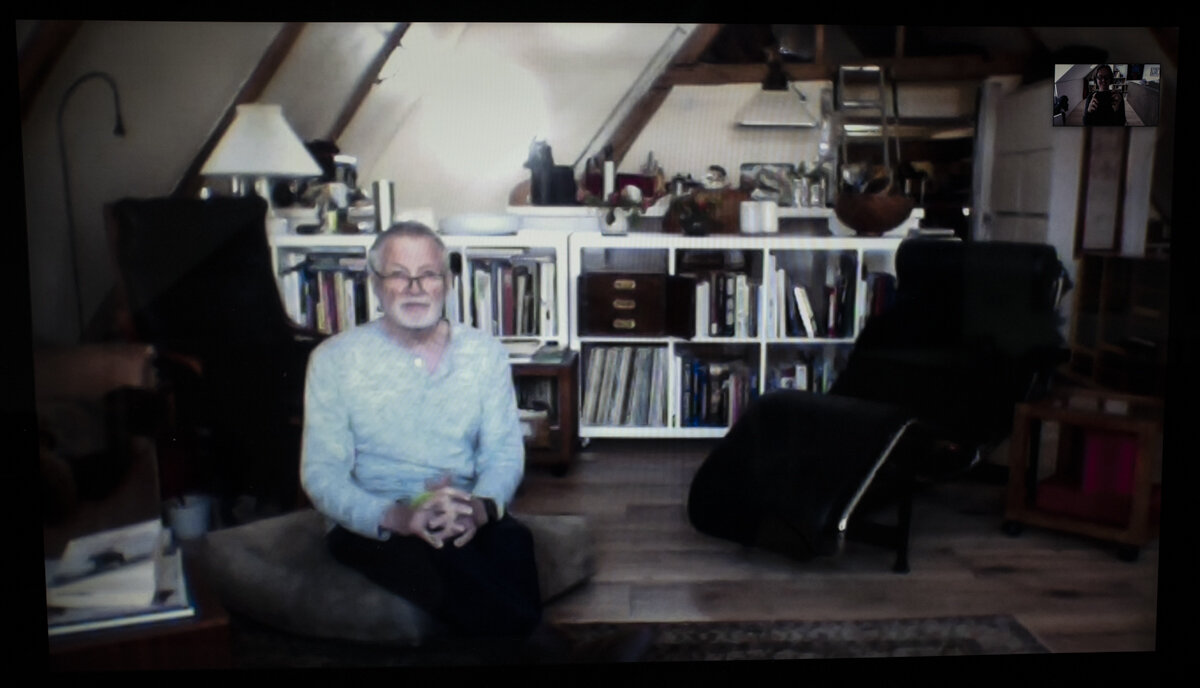
Stephen is British and has lived in Denmark for 50 years. Since he retired 20 years ago, he also spends a lot of time in both Spain and Norway. Even though the travelling from country to country has had to stop, Stephen has been able to continue with much of his active lifestyle during lockdown in Haderslev in South Denmark.
Stephen enjoys reading and creative writing and loves building and architecture. He says the builders merchants have never been busier than during lockdown. Everyone is taking the opportunity to do DIY and projects. Stephen has found it hard to have to stay away from both Norway and Spain during lockdown. He has very badly missed his library in Spain (“home is where the books are,” he says) and (not least) his Spanish friends and neighbours. He and his wife were simply trapped in Denmark when it began. There are no cases of COVID19 in his community so it feels quite safe.
Denmark and Norway have taken a very similar approach to the virus and Stephen expects that the border between the two countries might open soon. Sweden has taken a different, more relaxed approach. They have a civil servant, rather than politicians, making all the decisions about what they do.
Stephen hopes he will get back to travelling across Europe again soon. But, he cautions about the future: “We will just have to get used to staying in our cars”.
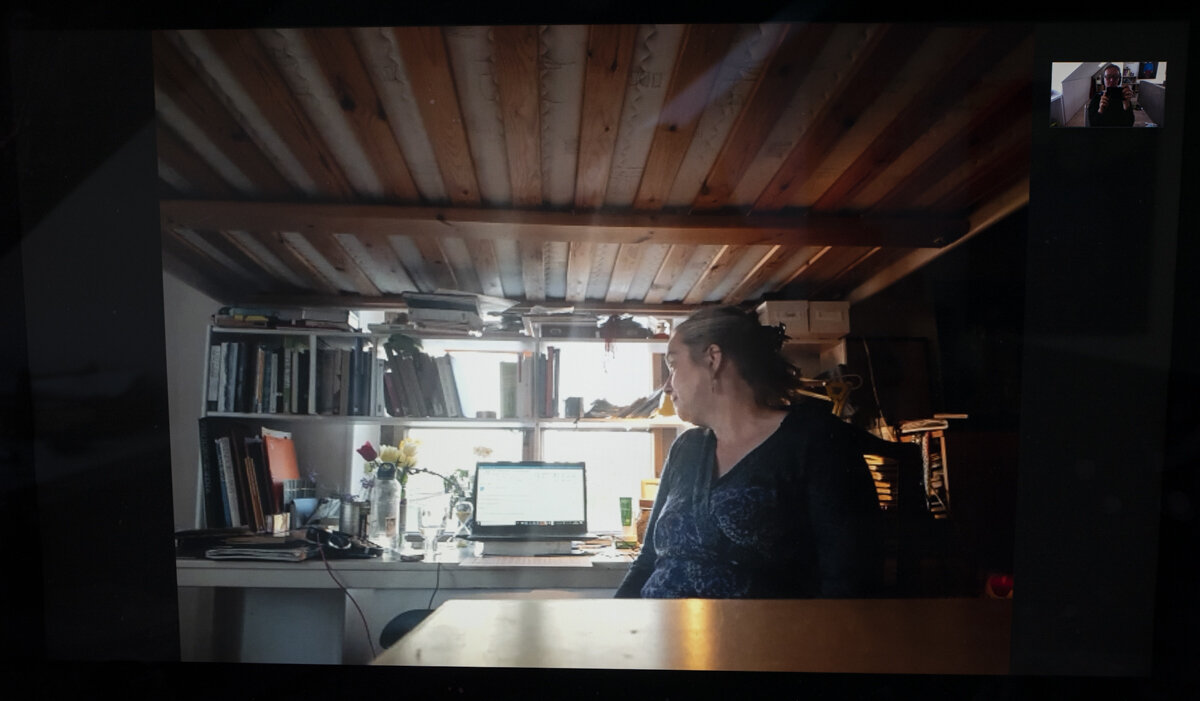
Patricia is Irish and living in a small town in France. She has two teenage children who have adapted well to the changes in their world.
At the beginning of lockdown the ambulance sirens could be heard passing by every morning, which was very shocking in such a small community. Now things have become quieter again.
This portrait is of Patricia at her home desk, under a bunk bed. She works for an international organisation as a digital archivist. She is very conscious of her colleagues in the field and how this virus will impact refugees in crowded conditions. It is very worrying on top of all refugees have gone through. She knows what a privilege it is to be able to stay home and work.
She also really appreciates the extra time she gains from not having to commute, and is enjoying the daily walks. Work is still intense and there are so many meetings. It’s harder not to slip into working long hours when you are locked down.
Patricia thinks that the response to the virus in France has been good. The government took the virus seriously at the right time. It took a while to get used to the idea of having documentation every time you went outside, but now it’s fine. The government has set out a plan for the reintegration of society and that is reassuring, says Patricia.
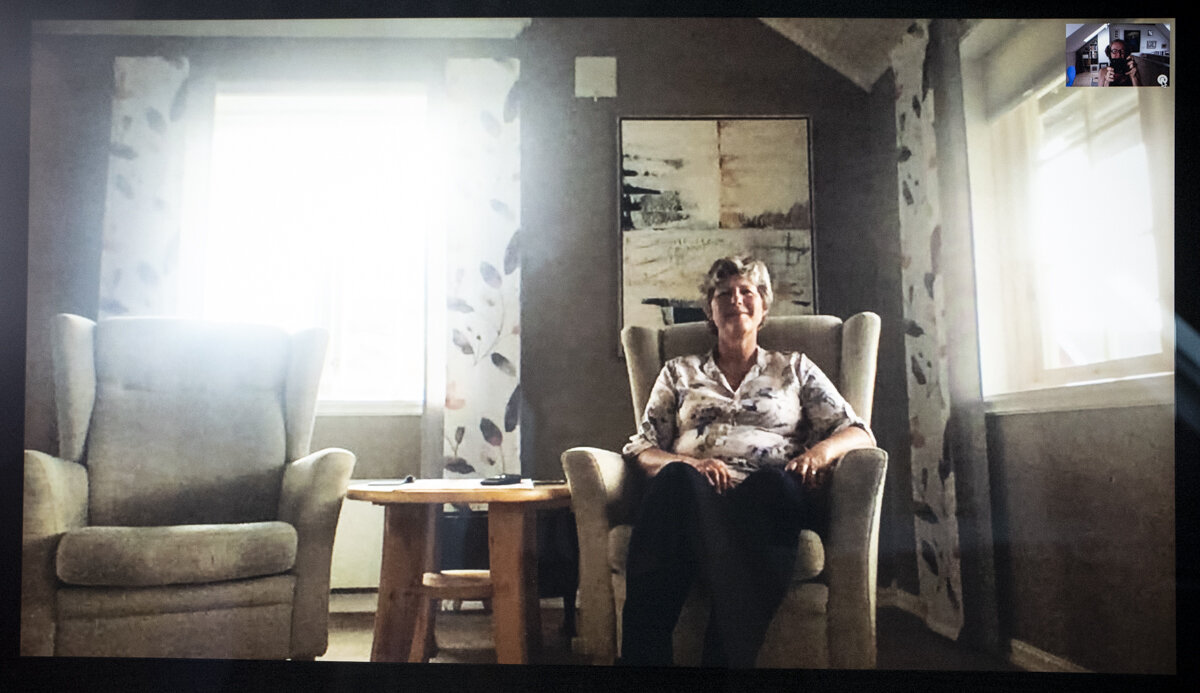
Kari is Norwegian. She lives to the East of Oslo, near the border with Sweden. I photographed her at the end of April for AreWeEurope Magazine.
Norway has contained the virus quite successfully and is starting to open up its society again. Where Kari lives is quite rural, with lots of green space and the coast nearby. Throughout this period she has been allowed to go out for a walk at any time, without restrictions. Kari has noticed that there are a lot more people walking in her area than before the lockdown, but it’s still quite easy to keep a distance, as they are expected to do.
The situation with the virus has made her appreciate what she has, and how living in the countryside makes things much easier. In fact, on the day when we spoke Kari had just handed in her notice for her job in the city, and is planning to continue working from now on as a swimming teacher and a landscape photographer. She already knows that the swimming pools will not reopen until the end of August.
Kari lives very close to the border with Sweden and would normally go shopping there. The prices are much lower, and it’s only 30 minutes drive to the supermarket. But because Sweden has not attempted to contain the virus in the same way as Norway, if she goes to Sweden now, she will have to quarantine herself for 14 days on her return. Otherwise, she might be subject to a fine of about £1500.
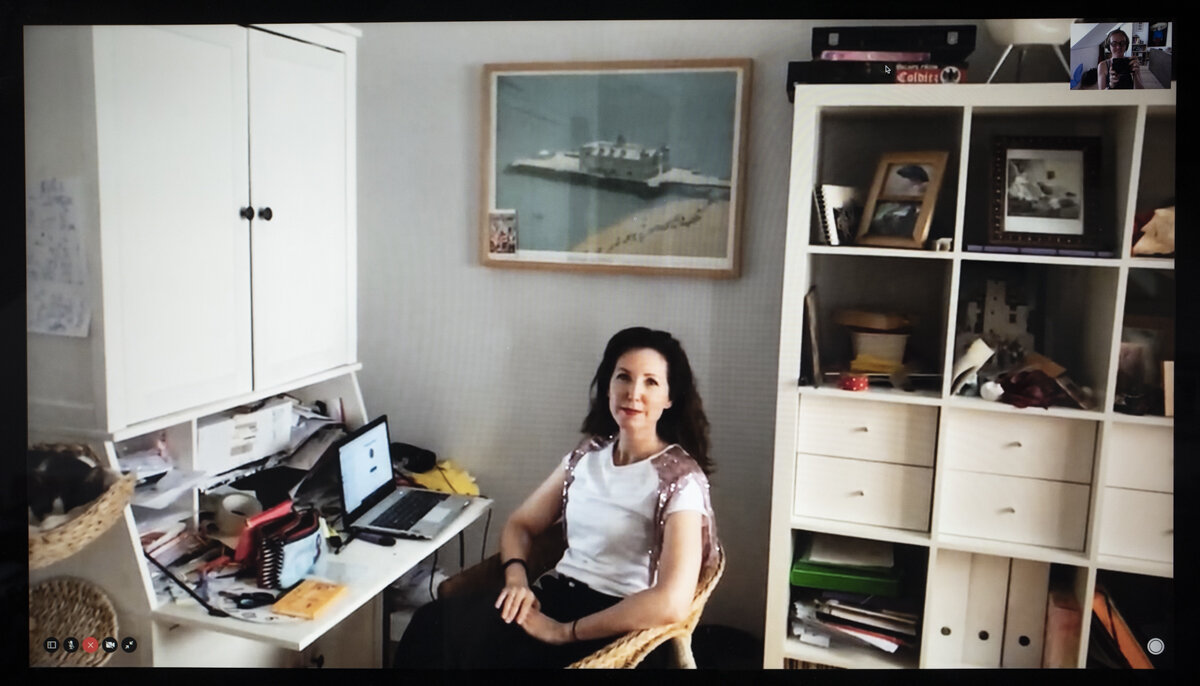
Harriet is British and has been in Spain for over 11 years. She lives with her husband and two teenage children in an apartment in Madrid.
Harriet is a teacher at the British Council and is now having to do all her teaching on line. Her children were not allowed outside for six weeks, although the restrictions are starting to ease now.
After Brexit, Harriet and her husband, who is also British, were thinking of applying for Spanish citizenship. Harriet says she was dragging her feet a bit. However, the response to COVID19 has changed the way she feels. She has felt very secure with the response of the Spanish government. She already had a lot of Spanish friends, but now she knows many more of her neighbours and feels much more part of her local community. Just before my call she was watching people across the street try to get paper aeroplanes into their neighbours’ windows. There’s a real community spirit.
Meanwhile, she has been very worried about her sister in the UK who has breast cancer, because of the slow initial response to the virus in the UK. Harriet says she is much more likely to apply for Spanish citizenship now.









Although Sweden has taken a less heavy handed approach to lockdown than most countries in Europe, life has certainly changed dramatically in Stockholm, where Annika lives. The city is very quiet, but it is not completely deserted. Many shops, cafes and restaurants remain open. You must keep your distance from other people and order from your seat, rather than at the bar. If restaurants and cafes do not comply with the social distance rules, they are closed down. All the museums are closed. You are discouraged from inviting people into your house and many people are now working from home.
Many schools for younger children have been kept open when staffing allows. Virtual schooling is the norm for older children or when too many teachers become sick.
Annika is a communications manager for a church and she now works from home a lot of the time. At her church, there are no ceremonies other than funerals and there are many more of those than normal. Mostly only 10 to 15 people will attend, although 50 are allowed. There are no gatherings or refreshments afterwards.
Annika’s father died in early March, just before many restrictions came into force. She says she would have hated not to be able to sit by his bedside. They were able to hold the funeral in Southern Sweden where things are still more relaxed than in Stockholm. They have had fewer COVID19 cases there. Sweden as a whole only has a population of 10 million, so it is far less densely inhabited than the UK.
The Swedish government took the approach that they wanted to ensure that everyone would be able to receive the care they needed, without shutting things down completely. Annika says she was sceptical at first about this response but now wonders if it isn’t going to make opening up society again much easier than for countries like their neighbour Norway. Surely, she ponders, society cannot be kept closed for two years.
Dirk lives in the Bavarian Alps in a ski resort called Garmish-Partenkirchen. He works as a leadership consultant and a health practitioner. Much of his work can continue via Zoom calls and Skype. In normal times, Dirk also rents out a couple of holiday apartments. The government no longer allows this and if he were to do so, there would be a large fine.
Dirk feels very blessed to live in such a beautiful part of the world and for the first time to be able to enjoy it without any tourists. His partner is Romanian, and she is also content to be so close to nature during this time, rather than in her apartment in Bucharest.
Bavaria was one of the Corona Virus hotspots as the pandemic hit Europe. It still has quite a high number of cases. However, Germany appears to have had an effective response, which is supported by the vast majority of the population. Consequently, their society is slowly opening up and things are gradually being relaxed. Many shops are now open to mask wearing customers, but there is still a lot of fear.
In the beginning of March in Germany, all the hospitals were emptied of people suffering from ailments other than COVID19, so that they wouldn’t be overwhelmed. Dirk wonders about the cost to those sick people without the virus. He also wonders about all the elderly who have been forcibly isolated. “If I was 85 and told that I couldn’t see my family, I would wonder what it’s all about,” he says.
Dirk thinks that, perhaps this lockdown will lead to a reset of society but believes there are many ethical questions to be asked about our response so far.
Father Simon is a monk at Glenstal Abbey, near Limerick in the West of Ireland. He became a monk when he was 19 years old and this year will be his 50th Jubilee.
The COVID19 lockdown has been the first time in those 50 years that he’s know the Abbey to be so tranquil. Simon told me “There’s harmony and peace. It’s the Abbot’s dream! All the monks are here, they can’t go anywhere and it’s quiet.”
In the Abbey grounds there is a boarding school and a guest house. Usually, there are lots of visitors, cars and of course, school children. Currently, there are none and Simon worries about how things will ever get back to normal, in particular the school.
One of Father Simon’s roles prior to the lock down was to run retreats. These have all been cancelled for the time being, but he’s started to make recordings for broadcast on You Tube. The films have been well received but Simon says, he needs to be careful that he doesn’t put too much pressure on himself, to broadcast too often. Last year he suffered from burn out after a period of working too hard, he doesn’t want that to happen again. He told me he’s taking a little holiday away from his monastic cell, in the under utilised Abbey Guest house, at the moment. Hopefully that will help!
Ireland has kept its COVID infections relatively low and things are going to start opening up again soon. I’m sure the future of Glenstall Abbey will not be so quiet.
Ane is from Denmark but has lived in the UK for 25 years. She has been a silversmith for 20 years. I photographed her via Zoom in her garden studio.
Ane lives in Hackney, East London, where she loves her community and feels a great solidarity with her neighbours. Even though there have been quite a lot of cases of COVID19 in her area, Ane feels very happy to be there. However, she is relieved that her 81 year old mother is in Denmark, where the situation appears to be much safer. If her mother was in the UK while she was in Denmark, Ane says she would be much more concerned.
As a maker, who works from her recently completed garden studio, Ane says that isolation and repetition are familiar to her. However, with three children at home since lockdown, she is busier than ever and can only carve out about 15 hours per week to work.
Ane says that she loves an artistic brief, a restriction, to aid her creativity. For 8 years she had a self-imposed a rule of only making work from one sheet of metal. Lockdown has created a new kind of restriction on her work. So, she has decided for the time-being that she will only make what she already knows.
This year Ane was hoping to have a solo exhibition to celebrate her 21st birthday of being a silversmith at a gallery which is also 21 years old. The exhibition has been cancelled. Nevertheless, whatever happens, Ane says she finds it essential for her own well-being that she keeps on making.
Stephen is British and has lived in Denmark for 50 years. Since he retired 20 years ago, he also spends a lot of time in both Spain and Norway. Even though the travelling from country to country has had to stop, Stephen has been able to continue with much of his active lifestyle during lockdown in Haderslev in South Denmark.
Stephen enjoys reading and creative writing and loves building and architecture. He says the builders merchants have never been busier than during lockdown. Everyone is taking the opportunity to do DIY and projects. Stephen has found it hard to have to stay away from both Norway and Spain during lockdown. He has very badly missed his library in Spain (“home is where the books are,” he says) and (not least) his Spanish friends and neighbours. He and his wife were simply trapped in Denmark when it began. There are no cases of COVID19 in his community so it feels quite safe.
Denmark and Norway have taken a very similar approach to the virus and Stephen expects that the border between the two countries might open soon. Sweden has taken a different, more relaxed approach. They have a civil servant, rather than politicians, making all the decisions about what they do.
Stephen hopes he will get back to travelling across Europe again soon. But, he cautions about the future: “We will just have to get used to staying in our cars”.
Patricia is Irish and living in a small town in France. She has two teenage children who have adapted well to the changes in their world.
At the beginning of lockdown the ambulance sirens could be heard passing by every morning, which was very shocking in such a small community. Now things have become quieter again.
This portrait is of Patricia at her home desk, under a bunk bed. She works for an international organisation as a digital archivist. She is very conscious of her colleagues in the field and how this virus will impact refugees in crowded conditions. It is very worrying on top of all refugees have gone through. She knows what a privilege it is to be able to stay home and work.
She also really appreciates the extra time she gains from not having to commute, and is enjoying the daily walks. Work is still intense and there are so many meetings. It’s harder not to slip into working long hours when you are locked down.
Patricia thinks that the response to the virus in France has been good. The government took the virus seriously at the right time. It took a while to get used to the idea of having documentation every time you went outside, but now it’s fine. The government has set out a plan for the reintegration of society and that is reassuring, says Patricia.
Kari is Norwegian. She lives to the East of Oslo, near the border with Sweden. I photographed her at the end of April for AreWeEurope Magazine.
Norway has contained the virus quite successfully and is starting to open up its society again. Where Kari lives is quite rural, with lots of green space and the coast nearby. Throughout this period she has been allowed to go out for a walk at any time, without restrictions. Kari has noticed that there are a lot more people walking in her area than before the lockdown, but it’s still quite easy to keep a distance, as they are expected to do.
The situation with the virus has made her appreciate what she has, and how living in the countryside makes things much easier. In fact, on the day when we spoke Kari had just handed in her notice for her job in the city, and is planning to continue working from now on as a swimming teacher and a landscape photographer. She already knows that the swimming pools will not reopen until the end of August.
Kari lives very close to the border with Sweden and would normally go shopping there. The prices are much lower, and it’s only 30 minutes drive to the supermarket. But because Sweden has not attempted to contain the virus in the same way as Norway, if she goes to Sweden now, she will have to quarantine herself for 14 days on her return. Otherwise, she might be subject to a fine of about £1500.
Harriet is British and has been in Spain for over 11 years. She lives with her husband and two teenage children in an apartment in Madrid.
Harriet is a teacher at the British Council and is now having to do all her teaching on line. Her children were not allowed outside for six weeks, although the restrictions are starting to ease now.
After Brexit, Harriet and her husband, who is also British, were thinking of applying for Spanish citizenship. Harriet says she was dragging her feet a bit. However, the response to COVID19 has changed the way she feels. She has felt very secure with the response of the Spanish government. She already had a lot of Spanish friends, but now she knows many more of her neighbours and feels much more part of her local community. Just before my call she was watching people across the street try to get paper aeroplanes into their neighbours’ windows. There’s a real community spirit.
Meanwhile, she has been very worried about her sister in the UK who has breast cancer, because of the slow initial response to the virus in the UK. Harriet says she is much more likely to apply for Spanish citizenship now.